There has been a lot of talk in this election cycle about “political correctness” and its damage to society. Mr. Trump claimed in his response to the mass shooting in Orlando that “we can’t afford to have political correctness anymore.” I don’t want this to be another one of my political pieces, but I think this is something much bigger than the election, something that affects our lives day-to-day. Political correctness isn’t a just a practice for pandering to constituents; it’s an important choice in our vocabulary that helps to shape our world.
Oxford Dictionaries define “political correctness” as “the avoidance, often considered as taken to extremes, of forms of expression or action that are perceived to exclude, marginalize, or insult groups of people who are socially disadvantaged or discriminated against”. It is this connotation of “often considered as taken to extremes” that causes problems for many Americans. They see certain language as fake, a way to avoid taking real positions, a ploy to avoid alienating voters. But if we ignore that connotation and look at the rest of the definition, we see something we should all be able to get behind, avoiding terms that “exclude, marginalize, or insult” people.
Communication scholars W.B. Pearce and V. Cronen theorize that communication is fundamentally the “coordinated management of meaning”. John Stewart describes in his communication textbook "Together" the “worlds of meaning” each person forms from their communication. The Pygmalion Effect is a communication scholar’s name for a “self-fulfilling prophesy”: ascribing an identity or a characteristic of a person may cause them to assume that identity. Even casual words and actions have this effect. Clearly, communication is much more powerful than you may think in forming the world we live in.
An advertisement from 1953 helps illustrate this ideal. Featured on Purple Clover’s “13 Stunningly Sexist Ads from the Fifties”, the advertisement for Del Monte Ketchup shows a woman with a surprised look on her face holding a bottle of ketchup and looking as if she’s about to open the bottle. The caption reads “You mean a woman can open it? Easily- without a knife blade, a bottle opener, or even a husband!” This language functions to support the idea in society that women are weak and dependent on their husbands all from the language.
The same thing is true of communication today. When Donald Trump said in the second presidential debate that “African Americans and Hispanics are living in hell,” “you walk down the street and you get shot,” and “African American communities are being decimated by crime,” he is perpetuating stereotypes that African American people and communities are dangerous. These generalizations prove to support stereotypes that may lead to the Pygmalion Effect, and at the very least support judgment across our nation. This judgment may lead to fewer options for African Americans. It also encourages practices like “Stop and Frisk” implicitly, although Trump made sure to make that point explicitly as well. The same thing is to be said by demonizing refugees, Arabs, and Mexicans.
The problem is also true when we are talking to one another about LGBTQ individuals or people with disabilities or any race or gender. We can’t afford not to have political correctness because we can’t afford to have a world of hate, discrimination, and fear.





















